The Flying Lizards were an experimental English new wave band, formed in 1976. They are best known for their eccentric cover version of Barrett Strong's "Money", featuring Deborah Evans-Stickland on lead vocals, which reached the UK and North American record charts in 1979. They followed this with their self-titled album that year, which reached number 60 on the UK Albums Chart.
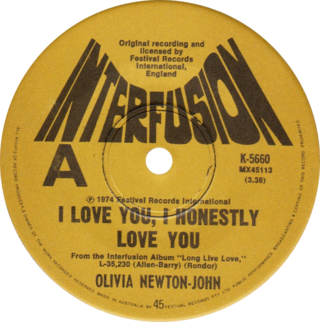
"I Honestly Love You" is a song recorded by Olivia Newton-John and released in 1974 on the album Long Live Love in the United Kingdom and If You Love Me, Let Me Know in the United States. The song became a worldwide pop hit, her first number-one single in the United States and Canada. The single was first released in Australia as "I Love You, I Honestly Love You", as per its chorus. The song was written by Jeff Barry and Australian singer and composer Peter Allen. The latter recorded it around the same time for his album Continental American.

"Yellow" is a song by the British rock band Coldplay. The band wrote the song and co-produced it with British record producer Ken Nelson for their debut album, Parachutes (2000). The song was released on 26 June 2000 as the second UK single from Parachutes, following "Shiver", and as the lead single in the United States.

"The Scientist" is a song by British rock band Coldplay. The song is credited to all the band members on their second album, A Rush of Blood to the Head. It is built around a piano ballad, with lyrics telling the story about a man's desire to love and an apology. The song was released in the United Kingdom on 4 November 2002 as the second single from A Rush of Blood to the Head and reached number 10 in the UK Charts. It was released in the United States on 15 April 2003 as the third single and reached number 18 on the US Billboard Modern Rock Tracks chart and number 34 on the Adult Top 40 chart.

"Trouble" is a song by British rock band Coldplay, for their debut album, Parachutes (2000). The band wrote and co-produced it with British record producer Ken Nelson. The song's arrangement is built around the acoustic piano. It was released on 23 October 2000 as the album's third single, reaching number 10 on the UK Singles Chart and becoming the band's second top 10 single in the country. Although "Trouble" failed to chart in the United States, the music press deemed it almost as successful as its predecessor, "Yellow".

"Shiver" is a song by British rock band Coldplay which appeared on the band's debut album Parachutes (2000), and was released as the album's lead single in the United Kingdom and second single in the United States following "Yellow". As a single it reached number 35 on the UK Singles Chart, number 26 on the US Alternative Airplay, and 57 on the Australian ARIA Charts. Its critical reception has been generally positive.

"Fix You" is a song by British rock band Coldplay. It was written by all four members of the band for their third studio album, X&Y (2005). It was released on 5 September 2005 as the second single from X&Y and reached number 4 on the UK Singles Chart. The song reached number 18 in the United States Billboard Hot Modern Rock Tracks. Promo singles were released for the UK and US.
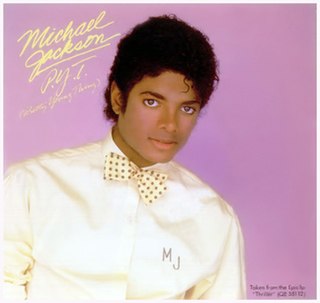
"P.Y.T. " is a song by American singer, songwriter and dancer Michael Jackson, released as the sixth single from his sixth album, Thriller (1982). The song was written by James Ingram and Quincy Jones.

"I Was Made for Lovin' You" is a song by American hard rock band Kiss, originally released on their 1979 album, Dynasty. It was released as the A-side of their first single from the album, with "Hard Times" as the B-side.

"I Have a Dream" is a song by Swedish pop group ABBA. It was released in December 1979 as the fourth international and final single from the group's sixth studio album, Voulez-Vous. Anni-Frid Lyngstad sang lead vocals. It was a major hit, topping the charts in many countries and peaking at No. 2 in the UK over the Christmas week of 1979. The single was in fact released after the non-album single Gimme! Gimme! Gimme! and after the release of the compilation Greatest Hits Vol. 2 - which didn't include "I Have a Dream".

"Free Fallin'" is the opening track from American musician Tom Petty's debut solo album, Full Moon Fever (1989). The song was written by Petty and his writing partner for the album, Jeff Lynne, and features Lynne on backing vocals and bass guitar. The duo wrote and recorded the single in two days, making it the first song completed for Full Moon Fever.

"Clocks" is a song by British rock band Coldplay, released on 17 March 2003 via Parlophone Records in the United Kingdom. It was written and composed as a collaboration among all the members of the band for their second album, A Rush of Blood to the Head. The song is built around a piano riff, and features cryptic lyrics concerning themes of contrast and urgency. Several remixes of the track exist, and its riff has been widely sampled.

"Show Me Heaven" is a song written by American singer and songwriter Maria McKee, Eric Rackin and Jay Rifkin, and recorded by McKee for the soundtrack to the Tom Cruise film Days of Thunder, released in June 1990. Produced by Peter Asher, the power ballad received favorable reviews from most music critics, reached number one on the UK Singles Chart for four weeks and became the sixth-highest-selling single of 1990 in the UK. Additionally, the song became a worldwide hit, topping the charts of Belgium, the Netherlands, and Norway and becoming a top-five hit in Australia, Ireland, Sweden, and Switzerland. It has since been covered by numerous other artists, including Tina Arena.

Peter Allen was an Australian singer-songwriter, musician, and entertainer, known for his flamboyant stage persona, energetic performances, and lavish costumes. Allen's songs were made popular by many recording artists, including Elkie Brooks, Melissa Manchester and Olivia Newton-John, including Newton-John's first chart-topping hit "I Honestly Love You", and the chart-topping and Academy Award-winning "Arthur's Theme " by Christopher Cross.
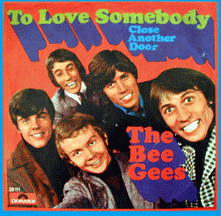
"To Love Somebody" is a song written by Barry and Robin Gibb. Produced by Robert Stigwood, it was the second single released by the Bee Gees from their international debut album, Bee Gees 1st, in 1967. The single reached No. 17 in the United States and No. 41 in the United Kingdom. The song's B-side was "Close Another Door". The single was reissued in 1980 on RSO Records with "How Can You Mend a Broken Heart" as its flipside. The song ranked at number 94 on NME magazine's "100 Best Tracks of the Sixties". The entry was a minor hit in France but reached the top 10 in Canada.
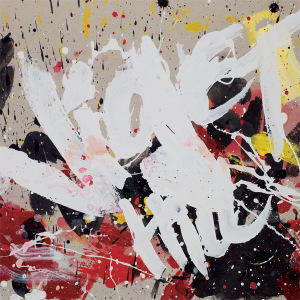
"Violet Hill" is a song by British rock band Coldplay. It was written by all members of the band for their fourth album, Viva la Vida or Death and All His Friends (2008). Built around a repeating guitar sound, it utilises a marching tempo, supported by the pianos and rhythms that accompany the song's lyrics. The song was initially made available as a free download on the band's website and was downloaded more than two million times.
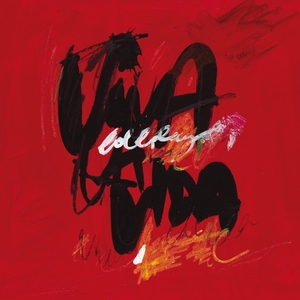
"Viva la Vida" is a song by British rock band Coldplay. It was written by all members of the band for their fourth album, Viva la Vida or Death and All His Friends (2008). The lyrics contain historical and Christian references, and the track is built around a looping string section with a digitally processed piano, while other layers are gradually added.
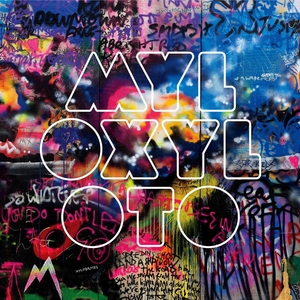
Mylo Xyloto is the fifth studio album by British rock band Coldplay, released on 24 October 2011. The band worked closely with producer Brian Eno following their successful collaboration on Viva la Vida or Death and All His Friends (2008), the band's previous album.
"Don't Cry Out Loud" is a song written in 1976 by Peter Allen with lyricist Carole Bayer Sager that is best known as a hit single for Melissa Manchester in the US and for Elkie Brooks in the UK.

"Every Teardrop Is a Waterfall" is a song by British rock band Coldplay. It was released as the lead single for their fifth studio album Mylo Xyloto on 3 June 2011. An exclusive digital EP version of it, with the B-sides "Major Minus" and "Moving to Mars", came out in the following weeks, being considered the band's eighth extended play. The track contains elements of the 1976 song "I Go to Rio" written by Peter Allen and Adrienne Anderson. It debuted at number 29 on the Billboard Hot 100 in the United States, selling 85,000 copies in its first week before climbing to its peak of number 14. On the UK Singles Chart, the song peaked at number 6.

















